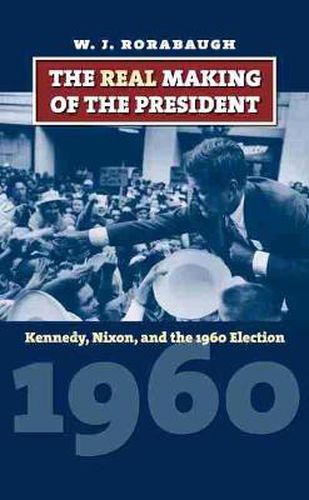Readings Newsletter
Become a Readings Member to make your shopping experience even easier.
Sign in or sign up for free!
You’re not far away from qualifying for FREE standard shipping within Australia
You’ve qualified for FREE standard shipping within Australia
The cart is loading…






This title is printed to order. This book may have been self-published. If so, we cannot guarantee the quality of the content. In the main most books will have gone through the editing process however some may not. We therefore suggest that you be aware of this before ordering this book. If in doubt check either the author or publisher’s details as we are unable to accept any returns unless they are faulty. Please contact us if you have any questions.
When John Kennedy won the presidency in 1960, he also won the right to put his own spin on the victory - whether as an underdog’s heroic triumph or a liberal crusader’s overcoming special interests. Now W. J. Rorabaugh cuts through the mythology of this famous election to explain the nuts-and-bolts operations of the campaign and offer a corrective to Theodore White’s flawed classic,
The Making of the President . Despite a less than liberal record, JFK assumed the image of liberal hero - thanks to White and other journalists who were shamelessly manipulated by the Kennedy campaign. Rorabaugh instead paints JFK as the ideological twin of Nixon and his equal as a bare-knuckled politician, showing that Kennedy’s hard-won, razor-thin victory was attributable less to his legendary charisma than to an enormous amount of money, an effective campaign organization, and television image-making. The 1960 election, Rorabaugh argues, reflects the transition from the dominance of old-style boss and convention politics to the growing significance of primaries, race, and especially TV - without which Kennedy would have been neither nominated nor elected. He recounts how JFK cultivated delegates to the 1960 Democratic convention; quietly wooed the still-important party bosses; and used a large personal organization, polls, and TV advertising to win primaries. JFK’s master stroke, however, was choosing as a running mate Lyndon Johnson, whose campaigning in the South carried enough southern states to win the election. On the other side, Rorabaugh draws on Nixon’s often-ignored files to take a close look at his dysfunctional campaign, which reflected the oddities of a dark and brooding candidate trapped into defending the Eisenhower administration. Yet the widely detested Nixon won almost as many votes as the charismatic Kennedy. This leads Rorabaugh to re-examine the darker side of the election: the Republicans’ charges of vote fraud in Illinois and Texas, the use of money to prod or intimidate, manipulation of the media, and the bulldozing of opponents.
The Real Making of the President
gives us a sobering look at all of this, fundamentally reshaping our understanding of one of the nation’s most memorable elections.
$9.00 standard shipping within Australia
FREE standard shipping within Australia for orders over $100.00
Express & International shipping calculated at checkout
This title is printed to order. This book may have been self-published. If so, we cannot guarantee the quality of the content. In the main most books will have gone through the editing process however some may not. We therefore suggest that you be aware of this before ordering this book. If in doubt check either the author or publisher’s details as we are unable to accept any returns unless they are faulty. Please contact us if you have any questions.
When John Kennedy won the presidency in 1960, he also won the right to put his own spin on the victory - whether as an underdog’s heroic triumph or a liberal crusader’s overcoming special interests. Now W. J. Rorabaugh cuts through the mythology of this famous election to explain the nuts-and-bolts operations of the campaign and offer a corrective to Theodore White’s flawed classic,
The Making of the President . Despite a less than liberal record, JFK assumed the image of liberal hero - thanks to White and other journalists who were shamelessly manipulated by the Kennedy campaign. Rorabaugh instead paints JFK as the ideological twin of Nixon and his equal as a bare-knuckled politician, showing that Kennedy’s hard-won, razor-thin victory was attributable less to his legendary charisma than to an enormous amount of money, an effective campaign organization, and television image-making. The 1960 election, Rorabaugh argues, reflects the transition from the dominance of old-style boss and convention politics to the growing significance of primaries, race, and especially TV - without which Kennedy would have been neither nominated nor elected. He recounts how JFK cultivated delegates to the 1960 Democratic convention; quietly wooed the still-important party bosses; and used a large personal organization, polls, and TV advertising to win primaries. JFK’s master stroke, however, was choosing as a running mate Lyndon Johnson, whose campaigning in the South carried enough southern states to win the election. On the other side, Rorabaugh draws on Nixon’s often-ignored files to take a close look at his dysfunctional campaign, which reflected the oddities of a dark and brooding candidate trapped into defending the Eisenhower administration. Yet the widely detested Nixon won almost as many votes as the charismatic Kennedy. This leads Rorabaugh to re-examine the darker side of the election: the Republicans’ charges of vote fraud in Illinois and Texas, the use of money to prod or intimidate, manipulation of the media, and the bulldozing of opponents.
The Real Making of the President
gives us a sobering look at all of this, fundamentally reshaping our understanding of one of the nation’s most memorable elections.